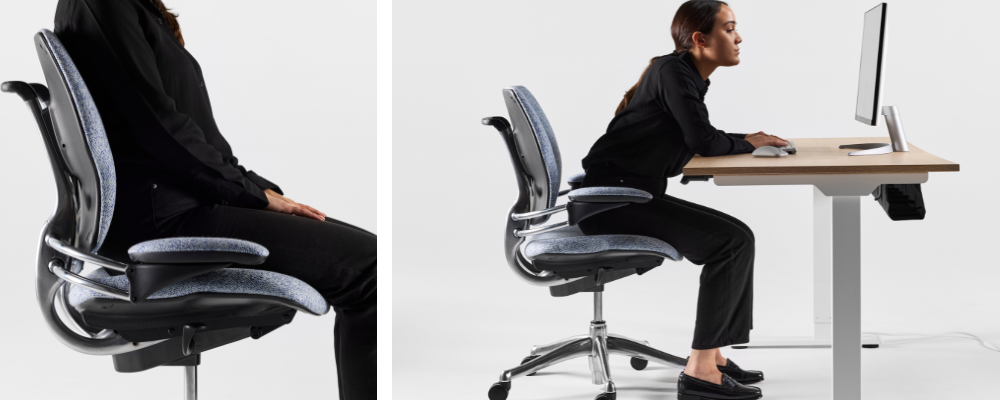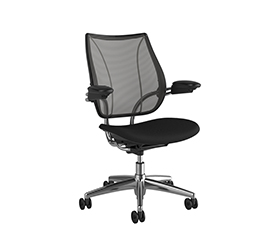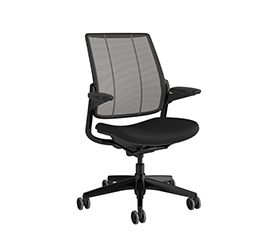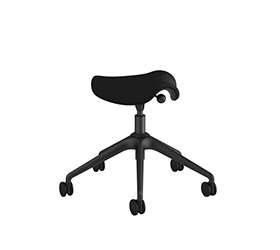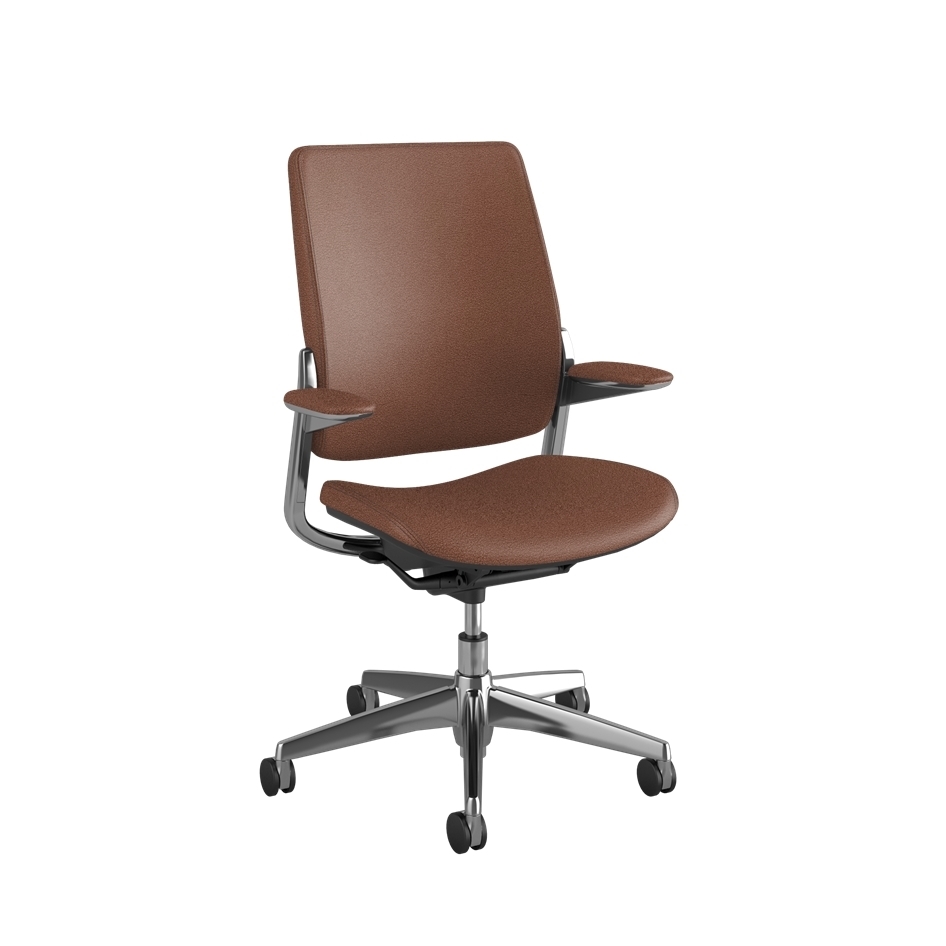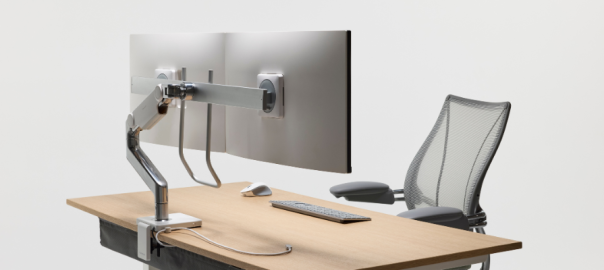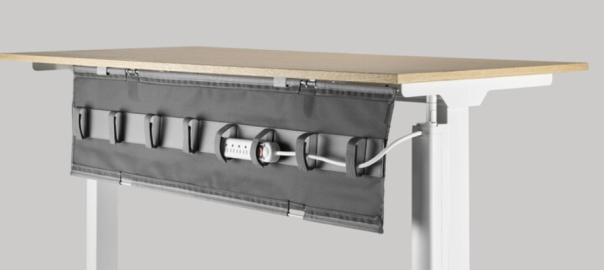Maintaining good posture is essential for your overall health, yet many people underestimate its importance. Poor posture causes various issues, including back pain, headaches, and decreased energy levels.
In the last five years, there’s been a five-fold increase 1 in children aged 16 and above experiencing back and neck pain. This alarming statistic highlights how posture-related problems are becoming more prevalent, starting earlier and affecting people across all demographics—regardless of age, income, or gender.
However, you have a variety of solutions to correct your posture. From an office chair with a headrest to specialised ergonomic furniture, these solutions are designed to encourage a healthy posture, particularly in your work-from-home setup.
This article is all about the importance of good posture and how integrating ergonomic solutions can help you maintain it, ultimately leading to a healthier, more productive lifestyle.
Ever wonder how your posture affects more than just your appearance?
When people think about posture, they often focus on how it makes them look—standing tall or sitting straight might come across as more confident or poised. But the importance of good posture goes far beyond appearance. Good posture impacts much more than how you look; it influences your overall health and well-being.
Maintaining the right alignment has a range of benefits that significantly improves your daily life, from your physical health to your mental well-being. So, if you’ve been overlooking how you carry yourself, it’s time to take a deeper look at the importance of good posture and why it really matters.
Why good posture matters?
Your posture plays a bigger role in your health and well-being than you might think. Poor posture causes many people to suffer from back pain, fatigue, and even headaches, but it’s often overlooked. The statistics highlight the importance of correcting it early on.
For example, did you know incorrect posture contributes to low back pain in over 30-40% of the working population yearly? That’s a massive number of people dealing with discomfort that could be reduced or even prevented with good posture habits.
Similarly, the impact of poor posture extends beyond physical pain—it can lead to reduced lung capacity, increased tension in the neck, and even chronic headaches.
Correct posture helps you properly align bones, muscles, and joints, reducing these risks. By aligning your spine correctly, you lessen the strain on your body, improving your overall health and preventing issues like breathing difficulties or frequent headaches.
Incorporating good posture habits into your daily routine can significantly improve your quality of life, especially if you spend long hours sitting. Whether in an office chair with a headrest or using ergonomic furniture at home, the proper setup is critical to preventing posture-related issues. It’s not just about comfort; it’s about protecting your health.
What Are the Benefits Of Good Posture?
Good posture is often overlooked, but it significantly affects your overall well-being. Whether sitting at your desk or standing in line, how you hold your body affects much more than just how you look. So, what exactly are the benefits of good posture, and why should you care?
Here are some physical and mental benefits of maintaining proper alignment and how it can positively impact your daily life.
Physical Benefits of Good Posture
Poor posture, especially slouching, can lead to muscle tension in your neck and shoulders, often causing headaches. By sitting or standing correctly, you can reduce this tension and the likelihood of headaches. Some more physical benefits of good posture include:
Reduced Back and Neck Pain
One of the most common effects of poor posture is back and neck pain. Sitting or standing in a slouched position places extra strain on your muscles and spine, leading to discomfort and, over time, chronic pain. Correcting your posture can significantly reduce this strain, allowing your muscles to relax and support your body naturally.
If you experience frequent back pain, it might be time to rethink your seating arrangement. Consider investing in an office chair with a headrest or a chair for back pain relief to support your back and encourage proper alignment.
Improved Breathing
When you slouch, you compress your lungs, making it harder to take deep, full breaths. On the other hand, sitting or standing with proper posture allows your lungs to expand fully, improving oxygen flow throughout your body. This not only makes breathing easier but also does wonders for the overall health.
Breathing properly can also lead to more energy and focus. This is especially helpful if you spend long hours in a home office or work from a minimal desk. So, by maintaining good posture, you’re setting yourself up for a more productive day.
Reduced Risk of Injury
Bad posture places unnecessary pressure on your joints and muscles, increasing the risk of injury, especially in areas like your back, shoulders, and neck. By practising proper desk posture, you’re helping your body move in a way that reduces this risk.
Whether lifting heavy objects or simply reaching for something across your desk, good posture keeps your body in alignment and reduces the chance of straining a muscle. If you’re constantly looking for the best ergonomic office chair or other ergonomic furniture, these tools help you maintain proper alignment and prevent long-term issues.
Enhanced Exercise Performance
When your body is aligned correctly, you can exercise more effectively. Proper posture helps you maintain form during workouts, controlling your risk of injury and helping you get the most out of your exercise routine.
Poor posture can hinder performance and, if not careful, even cause injuries. Whether you’re lifting weights or doing yoga, keeping your posture in check ensures you’re working your muscles efficiently.
Mental and Emotional Benefits of Good Posture
Now, let’s look at some mental benefits of having a good posture:
Increased Confidence
Believe it or not, how you carry yourself affects your feelings. Research shows that good posture benefits your confidence levels. Standing tall with your shoulders back reflects an air of self-assurance, not just to those around you, but to yourself.
You’ll feel more empowered and ready to take on challenges. The next time you’re in an important meeting or preparing for a big presentation, think about how your posture might influence your performance.
Better Mood
Good posture improves not only how you look but also how you feel emotionally. Standing or sitting with proper alignment makes you less likely to feel tired or sluggish.
Good posture is important for reducing stress, which, in turn, can elevate one’s mood. Slouching or hunching over often correlates with feeling down or stressed, so improving one’s posture can be an easy way to improve one’s outlook on the day.
Reduced Stress and Anxiety
There’s a close connection between your body and mind, and your posture plays a crucial role in managing stress and anxiety. Poor posture can increase feelings of stress by physically constraining your body while standing or sitting up straight, which can help you feel more in control. This is one of the mental benefits of good posture that is often overlooked but can be a game-changer in how you approach your daily life.
Increased Productivity
When you’re comfortable and not constantly adjusting yourself due to poor posture, you’re more likely to stay focused on the task at hand. Proper posture can lead to increased energy levels and less distraction from aches and pains, making you more productive throughout the day. If you’re working in a work from home setup, having the correct ergonomic tools—like best posture chairs and a proper desk—can make a big difference in how much you get done.
Consequences of Poor Posture
Maintaining poor posture can significantly affect your health and productivity. If you find yourself slouching or sitting in uncomfortable positions for extended periods, here’s what it can lead to:
- Spine Misalignment: Poor posture changes the natural ‘S’ shape of your spine, leading to increased pressure on specific areas. This can cause long-term issues like chronic back pain, reduced flexibility, and even spinal injuries.
- Chronic Back, Neck, and Shoulder Pain: Slouching puts strain on your muscles, leading to discomfort in your back, neck, and shoulders. Over time, this can cause ergonomic hazards such as muscle stiffness or worse, herniated discs.
- Digestive Issues: Sitting with bad posture compresses your abdomen, slowing down digestion. Over time, this can lead to bloating, heartburn, or other digestive problems. Maintaining proper desk posture can prevent this.
- Breathing Difficulties: When you slouch, it compresses your chest, limiting your lung capacity. This restricts the amount of oxygen your body gets, which can make you feel tired and affect your focus. Good posture allows for better lung function and energy levels.
- Headaches and Migraines: The strain caused by poor posture affects your neck and shoulders, leading to tension headaches or even migraines. An office chair with a headrest can provide the necessary support to prevent this.
How to Improve Your Posture
The importance of good posture goes beyond just sitting up straight; it directly affects your energy levels, focus, and even mood throughout the day. So, what can you do to ensure you’re maintaining the correct posture? Let’s break it down with some practical tips.
1. Invest in Ergonomic Products
The first step toward better posture is using the right equipment. S Cube Ergonomics offers a variety of ergonomic furniture designed to help you maintain proper alignment and avoid the effects of poor posture. Here are a few options to consider:
- Humanscale Freedom Task Chair: This chair automatically adjusts to your body’s movement, providing lumbar support without the need for manual controls. Its headrest also cradles your neck, making it perfect for long hours of work.
- Humanscale Diffrient Smart Chair: With its weight-sensitive recline and dynamic lumbar support, this chair provides instant, personalised comfort for every user. It’s designed for simplicity and comfort, minimising the need for constant adjustments.
- Humanscale Liberty Task Chair: Featuring a tri-panel mesh backrest, this chair offers excellent lumbar support while promoting airflow. It’s an ideal option for those who value comfort and breathability.
2. Set Up a Proper Workspace
Creating a balanced home office setup or work-from-home setup is a must. To avoid slouching, ensure your desk is at the right height, and your monitor is positioned at the proper eye level. If you prefer a minimal desk setup, ensure it still meets your ergonomic needs by adding adjustable features to your furniture.
3. Maintain Proper Desk Posture
The importance of good posture while sitting at your desk cannot be overstated. Sit back in your chair with your feet flat on the floor, knees at a 90-degree angle, and your lower back supported by the chair’s lumbar support. Your computer screen should be at eye level, which prevents neck strain. Also, make sure your elbows are at your sides and bent at a 90-degree angle to avoid shoulder and wrist strain.
4. Move Around Frequently
Sitting for long hours can result in muscle stiffness, which is why taking regular breaks to move around is essential. Stand up, stretch, or walk a few steps every hour to keep your muscles active and avoid posture-related issues. It also helps to shift between sitting and standing if you have a standing desk as part of your minimal desk setup.
5. Strengthen Your Core
A strong core supports better posture. Incorporate simple exercises into your routine to strengthen your abdominal and lower back muscles. This will help you maintain proper alignment while sitting. The effect of poor posture is often linked to weak core muscles, so this step is essential.
6. Adjust Your Chair Regularly
Remember to adjust your chair according to your body’s needs regularly. Look for an office chair with a headrest that offers multiple adjustments, such as height, tilt, and lumbar support. This ensures that your spine is aligned and prevents long-term posture problems.
Conclusion
The importance of good posture cannot be overstated, especially in light of the alarming increase in posture-related issues among younger individuals. Ergonomic products play an imperative role when it comes to how to correct posture. The Benefits of Ergonomics include promoting proper alignment, reducing discomfort, and enhancing overall well-being. By investing in the right type of office chairs and adjustable desks, you can create a supportive environment that encourages better posture, ultimately improving your health and productivity.

